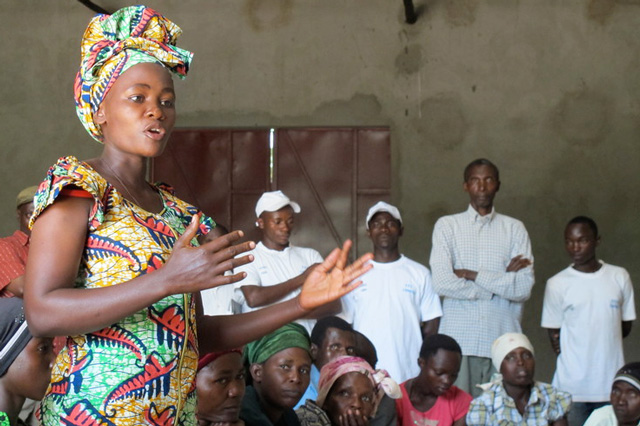Gender representation targets, a fund to support women in international global policy negotiations and a publicly tracking the process of achieving gender balance in decision-making organisations are among the recommendations made by the authors of a...
Gender representation targets, a fund to support women in international global policy negotiations and a publicly tracking the process of achieving gender balance in decision-making organisations are among the recommendations made by the authors of a new study on gender balance in climate change negotiations.
‘The Full View: Advancing the goal of gender balance in multilateral and intergovernmental processes’, a research report by the Mary Robinson Foundation – Climate Justice and UN Women, analysed the participation of women in decision-making and management processes at national and global levels of governance.
The report comes in the wake of Decision 23/CP.18, agreed by all Parties to the UNFCCC at COP 18 in Doha last year: ‘Promoting gender balance and improving the participation of women in UNFCCC negotiations and in the representation of Parties in bodies established pursuant to Convention or the Kyoto Protocol.’ The report’s authors believe the decision is an important step towards achieving gender equality and a more effective climate policy.

“At Doha last year the commitment was made. Now the opportunity must be seized,” Mary Robinson, President of the Mary Robinson Foundation – Climate Justice said. “In presenting this research, it is hoped Parties and observers are inspired by some of these recommendations, and consider them in preparing their submissions to the UNFCCC secretariat in the coming months on options and ways to advance the goal of gender balance.”
With the study featuring contributions from Gro Harlem Brundtland, former Prime Minister of Norway and former Director General of WHO; Erik Solheim, Chair of the OECD Development Assistance Committee and Ambassador Nozipho Mxakato, Ambassador at Large, Cop17/CMP7, it looks at the levels of success of approaches to achieving gender balance in governments around the world, and the effects that gender balance has had on national and international decisions and outcomes, particularly in areas of environment and development, and in climate change policy-making.
As a result of this analysis, the report sets out a number of recommendations, including:
- Setting a target on gender balance in both existing and new subsidiary bodies of the UNFCCC and Kyoto Protocol enforcement mechanisms.
- The establishment of a mechanism to sanction non-compliance with Decision 23/CP.18.
- The maintenance of a publicly available and regularly updated online database of women’s and men’s participation in UNFCCC processes.
- Consideration should be made on the creation of a fund to support women delegates’ participation in climate negotiations.
- Providing guidance to new informal bodies and groups in the negotiations process on the need to address gender balance in their set-up and include women as panellists in in-session workshops and roundtables.
The document is being launched today at ‘Promoting gender balance and the empowerment of women in the UNFCCC process’, taking place during the second session of the Ad Hoc Working Group on the Durban Platform for Enhanced Action (ADP2) in Bonn, Germany.
Today’s event will provide an open dialogue for Parties, observers, UN System entities, experts, civil society representatives and other shareholders to share insights and discuss efforts to strengthen gender balance, enhance the empowerment of women in the climate negotiations and advance gender-sensitive climate policy.
The event is organised by UN Women, the Mary Robinson Foundation – Climate Justice, the Global Gender and Climate Alliance (GGCA) and the United Nations Framework Convention on Climate Change (UNFCCC) secretariat. It will include speaking contributions from leading members of these organisations, including Verona Collantes, Inter-Governmental Specialist at UN Women, who will launch the research report there.
Related Links:
Affirmative action can restore gender balance at UN climate talks – report – RTCC, 07 June 2013
The Full View: Advancing the goal of gender balance in multilateral and intergovernmental processes – 29 May 2013


